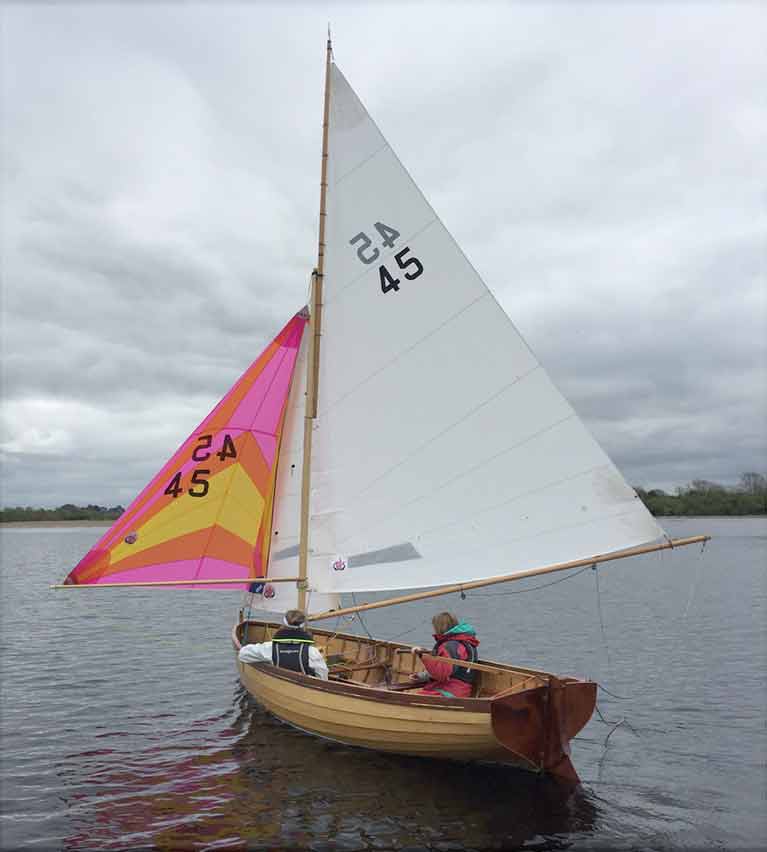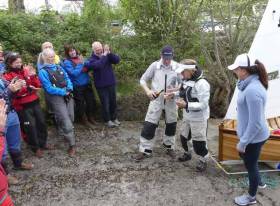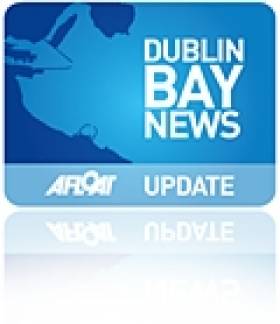Displaying items by tag: Con Murphy
Irish Race Officer Con Murphy will be Scottish Series Regatta Principal Race Officer
Con Murphy from the National Yacht Club in Dun Laoghaire Harbour will be the Principal Race Officer for May's Scottish Series Regatta on the Clyde in Scotland.
The regatta now has its team in place, and they are three highly accomplished Race Officers with a wealth of experience under their belts.
Murphy will run the IRC fleet. He is an internationally known sailor and International Race Officer. His experience includes Race Officer for the 49ers at the 2016 Rio Olympics. He will be joined by his wife Cathy, as Timekeeper, herself a former Olympic 470 sailor. Neither has ever been on duty at a Scottish event before - though competitors in the 2022 Bangor Town Regatta on Belfast Lough will remember Con when he was Principal Race Officer.
 Scottish Series Regatta racing on Loch Fyne Photo: Marc Turner
Scottish Series Regatta racing on Loch Fyne Photo: Marc Turner
The One Design fleet will be looked after by David Kent who needs less introduction locally as he hails from Largs Sailing Club on the Firth Clyde. He has supported the Scottish Series before and has officiated at all levels from local club to the Olympics and World Cup Series. Scottish Series Chairman Roddy Angus says, “We are so glad we didn't put him off last year and he's working up to a 'blast' for One Design!”.
On CYCA it will be John Readman. Johnny too is a familiar face locally and a past CCC Commodore. He has been a huge supporter of the Scottish Series over the years and currently acts as Principal Race Officer for West Highland Yachting Week. Roddy Angus is pleased to have him on the team. “We are delighted he has agreed to work with us, perhaps 'this one last time".
Con Murphy is Sailor of the Month for November (Services to Sailing)
There are few sailors in Ireland with more eclectic interests afloat than Con Murphy, as he is the husband and father of Olympic sailors, his wife Cathy having raced the 470 in the 1988 Olympics, while his daughter Annalise won the Silver Medal in the Lasers in 2016 in Rio.
But with interests extending in many directions, he has long been a multi-hull enthusiast, and in September 1993 he persuaded the late Steve Fossett to bring his superb 60ft trimaran Lakota to Ireland for a joint tilt at the Round Ireland Record, which had stood since November 1986. They did it with such style that their new time stood until June 2016, when the three larger MOD 70 trimarans finally sliced a little more off it during that year’s multiple record-breaking Round Ireland race from Wicklow.
Such breadth of experience brings its own deep sense of reassuring calm at challenging moments during World Championships, and on Lough Derg in late August Con Murphy oversaw an enjoyment-plus Fireball Worlds which saw Tom Gillard (GBR) and Andy Thompson (East Antrim Boat Club) take the title, while the best all-Irish team of Barry McCartin & Conor Kinsaella (Royal St George YC) just missed the podium with a very commendable fourth overall in a notably strong fleet.
Con Murphy from the National Yacht Club in Dun Laoghaire Harbour is an internationally known sailor and International Race Officer. So Bangor Town Regatta will be in safe hands as he will be the Principal Race Officer for the event to be hosted by the Royal Ulster Yacht Club at the end of June in Belfast Lough. He will have a local team helping cover the race areas.
During his long association with the world of sailing competitions which included Race Officer on the 49er course at the 2016 Rio Olympics, among other roles Con has been Race Director/PRO for Dun Laoghaire Regatta since its inception in 2011 also RO for the biennial Dun Laoghaire to Dingle race for many years. But it’s not all Committee boat work. He has raced many different classes and now regularly competes in the Water Wags in Dun Laoghaire and Shannon One Designs from Lough Ree and Lough Derg Yacht Clubs.
Con’s wife Cathy will be helping as a Timekeeper in Bangor. She has been sailing since a teenager and raced a 470 at the Seoul Olympics. She crewed with Con on Steve Fossett’s record-breaking trimaran Lakota in the 1993 Round Ireland Race and is now very active in the Water Wag and Shannon ODs classes.
Con says he is “looking forward to Bangor Week - we've done many Laser and Multihull and SB3 events on Belfast Lough over the years and have happy memories of camping on the RUYC Tennis Courts to the east of the clubhouse”.
Olympic Silver Medalist Annalise Murphy was on hand last Saturday to help parents Con Murphy and Cathy MacAleavey launch the new family dinghy, a traditional clinker–built Water Wag dinghy, a class that celebrates its 130th season this year.
The champagne corks were popped on the shores of Lough Ree as the travelling Wag fleet welcomed the new addition. Mariposa, Number 45.
Mary Kennedy from RTE's Nationwide TV programme sailed the first race with Cathy. Kennedy helmed in the light winds (even though she has never sailed before) and Mariposa actually led most of the way to the Wineport Lodge hotel finish but just got pipped at the line. The race and a piece on Cathy's new Wag wil be screened on Nationwide on Friday, 5th May. The new dinghy, that Cathy built herself, has already featured on the cover of influential French maritime heritage magazine, Chasse–Maree.
 RTE's Mary Kennedy takes the helm of the new Water Wag for an item on Nationwide to be aired next Friday, May 5
RTE's Mary Kennedy takes the helm of the new Water Wag for an item on Nationwide to be aired next Friday, May 5
The Wags were holding a training sesssion at the freshwater venue with coaching by the UK's Mark Rhodes. The foiling Moths were also sailing but unfortunately there was too little wind for them.
The new boat is only the latest of new arrivals to the fleet with number 46, Madamoiselle, launching in 2015 at the Royal Irish Yacht Club.
The class is the oldest one design in the world and can still boast to be onf of the most successful, with regular turnouts of 20 boats and more for Wednesday night racing in Dun Laoghaire harbour.
Last year, a 110 –year–old model, Pansy, was the winner of the Royal Irish YC regatta.
Four Championships (and a Mega Party) Planned for Dun Laoghaire 2011
A number of classes have already committed to run open championships within the regatta including the Wayfarer UK and Irish Nationals, the J109 Open Championship, the SB3 Open Championship and a return match of the Irish Sea Championship in J80s between Ireland and Wales. The race management team headed up by Con Murphy, aided by the usual ocean of wonderful volunteers, are working to facilitate this to ensure the kind of quality race management and organisation that will ensure the success of these championships.
The non-spinnaker fleet was the largest fleet in the Regatta in 2009 and is expected again to top the numbers and provide great racing for large boats with a smaller crew.
The regatta combines the wonderful waterfront facilities of all 4 Dun Laoghaire clubs and includes support from other clubs in the Dublin area including Howth. There will be a full on entertainment programme for all participants and many more with the continued support of many of the sponsors of 2009 which included Volvo Cars, Dublin Port, Dun Laoghaire Rathdown County Council, The Royal Marine Hotel, Helly Hansen, Dubarry and many more.
One of the highlights of the regatta are the Ladies Lunches which will again be held across a number of the clubs on the Saturday. Top Fashion, great food, a dash of style accompanies by the glass of champagne are the order of the day. All these at a very reasonable price reflecting the realities of today's tightened purse strings.
There will be more announcements in the coming weeks.
For more information visit www.dlregatta.org or event secretary Ciara Dowling at [email protected]































































